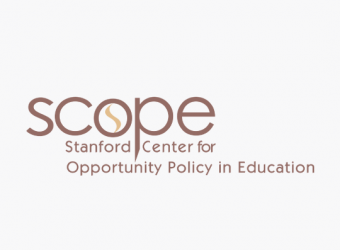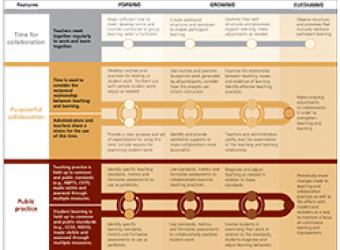Publications
Student Engagement in Assessments: What Students and Teachers Find Engaging
Guidance for educators, assessment developers, and policymakers on increasing student engagement in performance-based assessments.
Building Teacher and School Capacity to Teach to Ambitious Standards in High-Poverty Schools
Details of a district professional development initiative designed to support teachers in meeting the goals of Common Core State Standards.
Turning Around Schools: The National Board Certification Process as a School Improvement Strategy
How the National Board certification process can be used as a school improvement strategy and support enriched teaching.
Review Tool with Engagement Considerations for Item Reviewers/Evaluators
The review tool allows reviewers and evaluators to review tasks to ensure that they are created with engagement in mind for all students. In addition to scoring Engagement Dimensions and Task Features, the tool provides guidelines for evaluation and prompts for suggested modifications
Student Engagement: A Framework for On-demand Performance Assessment Tasks
Engaging students in meaningful applications of their knowledge is a key aspect of both addressing the standards and providing greater access. Not only do the standards emphasize the importance of meaningful engagement in real-world tasks, but evidence shows that engagement is strongly related to student performance on assessment tasks, especially for students who have been typically less advantaged in school settings.
Dimensions of Engagement: Definitions and Ways to Incorporate
This tool defines seven engagement dimensions such as collaboration and self-assessment. It provides suggestions and examples for incorporating each dimension into assessment tasks. For each dimension, the tool provides questions to consider and appended performance tasks as examples
Task Development Guidelines with Engagement Considerations for Item Writers
This tool provides specific guidelines for incorporating Engagement Dimensions and the required Task Features into performance tasks to support students’ ability to create meaning and cognitively invest in the task. Engaging tasks generally incorporate at lease three Engagement Dimensions and must include both Task Features: Clear Purpose and Clear Expectations
Engagement Toolkit for Performance Task Writers, Reviewers, and Evaluators
This three-part toolkit is designed to be an aid for creating performance tasks that are engaging to all students of diverse backgrounds.
Relating Aspects of Motivation to Facets of Mathematical Competence Varying in Cognitive Demand
Research on student motivation and performance on mathematical tasks relevant to the Common Core State Standards for Mathematics.
Promising Practices: A Literature Review of Technology Use by Underserved Students
This literature review focuses on promoting positive outcomes of student technology use and digital learning experiences.
Teaching for a Changing World: The Graduates of Bank Street College of Education – Full Series
This series examines a developmental-interaction approach that places learning at the fore of the teacher’s consciousness.
Teaching for a Changing World: The Graduates of Bank Street College of Education – Case Studies
These case studies examine what the Bank Street developmental-interaction approach looks like in practice.
Pathways to New Accountability Through the Every Student Succeeds Act
This report examines options available to states for redefining their accountability systems as they begin to implement the Every Student Succeeds Act (ESSA).
Global Education Reform
This book documents the ideologically and educationally distinctive approaches countries around the world have taken to structuring their education systems.
Redesigning School Accountability and Support: Progress in Pioneering States
Cook-Harvey and Stosich document the progress made by the 51st State Working Group in transforming accountability systems.
Maximizing the Use of New State Professional Learning Investments to Support Student, Educator, and School System Growth
The Learning Policy Institute (LPI) and the Stanford Center for Opportunity Policy in Education (SCOPE) introduce two documents to help California schools best utilize professional learning money to support learning around the newly adopted state academic standards.
Community Schools as an Effective Strategy for Reform
Research literature finds that community school models offering various agreed-upon features provide an excellent social return on investment and significant promise for providing opportunities for learning and promoting well-being in students and communities.
Growing a Waldorf-Inspired Approach in a Public School District
This report details specific practices and student outcomes of a Waldorf-inspired approach at a public K-8 school of choice in Sacramento.
Mapping the Development of Conditions for Collaborative Learning in School Communities of Practice
Developing and leading collaborative communities of practice within schools, where learning genuinely occurs, can be difficult and uncertain work. This tool provides offers a map and guidelines to guide school teams in this challenging work as they forge, grow and sustain the conditions that can support continuous learning for instructional improvement.
Mapping the Development of Conditions for Collaborative Learning in School Communities of Practice
This guide depicts collaborative learning in schools and is designed to be a resource to help educators strengthen the quality of collaboration.
















